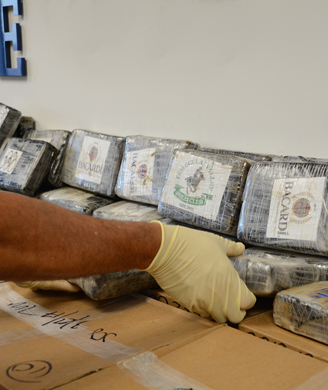ICE, CCSF arrests 4, seizes 1.6 tons of cocaine in Puerto Rico
SAN JUAN, Puerto Rico – U.S. Immigration and Customs Enforcement’s (ICE) Homeland Security Investigations (HSI) special agents, working jointly with officers of the Caribbean Corridor Strike Force (CCSF) arrested four men March 27 and seized a 9mm Glock pistol and 18 rounds of 9mm ammunition while attempting to smuggle 1.6 tons of cocaine. The contraband has an estimated street value of approximately $80 million.
U.S. Magistrate Judge Camille L. Vélez-Rivé authorized a complaint charging Wilson Cuevas-Alcántara, Evelio Rivera-Jiménez, Tairo Martínez-De Rosario and Juan C. Rodríguez with conspiracy to possess with intent to distribute cocaine and possession of cocaine.
On March 27, a U.S. Customs and Border Protection (CBP) marine patrol aircraft detected a vessel traveling southbound without navigation lights at approximately 40 nautical miles north of Dorado. The aircraft coordinated with a marine interceptor unit attached to the San Juan Border Enforcement Security Task Force (BEST) and the Coast Guard to intercept the vessel. The marine interceptor unit came to a short distance of the vessel at approximately four nautical miles north of the coast of Río Grande, and initiated the interdiction of the vessel by energizing its blue lights, siren and verbal commands. The vessel did not stop and continued at a high rate of speed of approximately 30 to 35 knots.
The marine interceptor unit fired two warning shots in an attempt to persuade the crew to stop the vessel but continued without obeying the law enforcement officer who fired six additional rounds to disable the vessel’s engines. CCSF officers arrested two individuals onboard and two others who jumped overboard during the pursuit and seized 48 bales containing 1,449 bricks of cocaine weighing approximately 1,608 kilograms. A field test yielded positive results to cocaine.
“This is another example of how our anti-crime plan, which establishes a close collaboration with the federal agencies, is producing great dividends, said Puerto Rico Police Department Superintendent Michelle Hernandez. “We congratulate all PRPD police officers who participated in this effort and the ICE HSI special agents for keeping our borders safe. Drug traffickers should know that we are working as a team to stop the flow of drugs on the Island.”
The San Juan BEST incorporates law enforcement and intelligence resources from HSI, CBP, PRPD, Coast Guard, Bureau of Alcohol Tobacco and Firearms, San Juan Police Department, Puerto Rico Ports Authority and Puerto Rico's Department of Treasury. These resources focus their investigative, interdiction and intelligence assets towards the identification, prioritization and investigation of emerging or existing threats related to our borders.
The CCSF is an initiative of the U.S. Attorney's Office created to disrupt and dismantle major drug trafficking organizations operating in the Caribbean. CCSF is part of the Organized Crime Drug Enforcement Task Force (OCDETF) that investigates South American-based drug trafficking organizations responsible for the movement of multi-kilogram quantities of narcotics using the Caribbean as a transshipment point for further distribution to the United States. The initiative is composed of HSI, DEA, FBI, US Coast Guard, US Attorney Office for the District of Puerto Rico, and PRPD's Joint Forces for Rapid Action.
The case is being prosecuted by Assistant United States Attorney Carlos R. Cardona.
Those arrested face a term of 10 years to life in prison for the narcotics violations. Criminal complaints are only charges and not evidence of guilt. A defendant is presumed to be innocent until and unless proven guilty.



